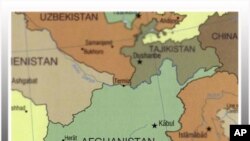International aid agencies are calling for restructuring the international community's strategy for development in Afghanistan. They want the focus to be on long-term poverty alleviation rather than political and military incentives.
Billions of dollars worth of aid has been pumped into Afghanistan, but international aid agencies say it still does not tackle the country's fundamental development issues.
A group of 23 British-based aid agencies, including Oxfam, Afghan Aid, and Action Aid along with Afghanistan-based aid groups have called for a radical change in aid strategy to Afghanistan.
Oxfam International project coordinator in Kabul, Ashley Jackson, says Western aid in Afghanistan is not keyed toward long-term development and poverty alleviation.
"The counter insurgency strategy being followed in Afghanistan is that a lot of aid is being delivered to insecure areas," Jackson said. "It is targeting hearts and minds of people rather than fitting into coherent development strategies and meeting basic needs. And that is not what development is, that is not what alleviates poverty."
Jackson contends the current aim appears to be to win over the local population with quick-fix projects against the insurgents. She also says that some projects, including setting up schools or health centers, are then poorly constructed, administered and monitored.
Melanie Brown communications officer for Afghan Aid, says much of the aid is not need based, but concentrated in areas of most Western-troop activity.
"Much of the aid is being given along perhaps political or military lines," Brown said. "If you look at spending in Helmand, in Kabul, compared to areas in the North there is a huge difference in the amount of money going to those areas."
According to the World Bank data, Afghanistan is one of the poorest countries in the world. The South Asian nation has been caught in a cycle of war, insurgency and lawlessness for decades.
Oxfam's Ashley Jackson says the lack of cohesive direction of international aid is alienating the Afghan population.
"But there is a real growing frustration where a lot of Afghans feel like you know they are still living in poverty, there is still spreading insecurity," Jackson said. "And they know that billions of dollars of aid has gone to Afghanistan and they have not seen their lives improve the way they had expected them to."
Britain hosts an international conference Thursday to discuss the future direction and strategy for Afghanistan.
Afghanistan Aid Strategy Must Change Say Aid Groups

International aid agencies want the focus to be on long-term poverty alleviation rather than political and military incentives



